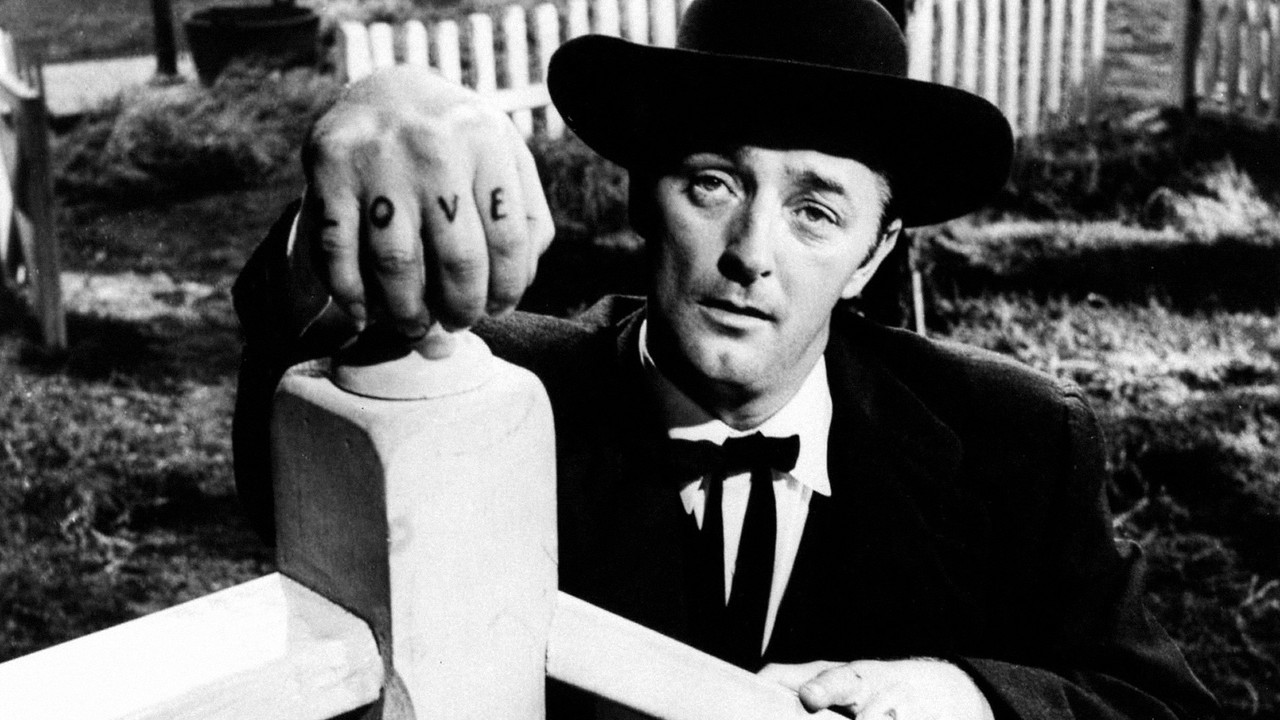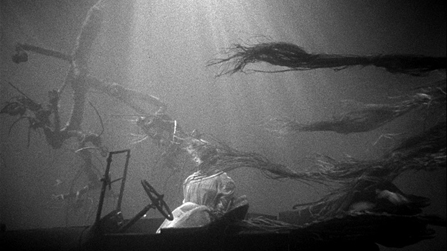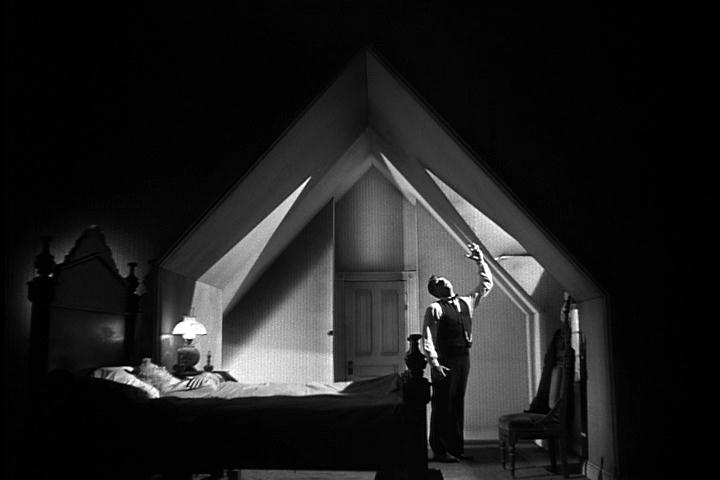Night of the Hunter (1955): A Blemished Gem
 12-18-2014 | tagged
12-18-2014 | tagged  Charles Laughton,
Charles Laughton,  Gothic,
Gothic,  James Agee,
James Agee,  Lilian Gish,
Lilian Gish,  Night of the Hunter,
Night of the Hunter,  Robert Mitchum,
Robert Mitchum,  Shelley Winters,
Shelley Winters,  expressionism,
expressionism,  horror |
horror |  Post a Comment |
Post a Comment |  Email Article |
Email Article | In the history of American cinema, rare films, perhaps no more than several, stand as inimitable singular works. Movies like Intolerance, 2001 Space Odyssey, and Who Framed Roger Rabbit qualify, as does Night of the Hunter. These movies boast not only a technical audacity, but also an admixture of quality source material and a marriage of talents whose synergy accounts for something that could not have been predicted, and as such could not have been planned for.
Released in 1955, Night of the Hunter was the directorial debut of venerated actor Charles Laughton, a movie vocational shift far less common in the days of classical Hollywood than it is today. Laughton's choice for lead also registered as unpredictable, since the film's sole star Robert Mitchum went against his cool, sleepy-eyed type in his portrayal therein. The movie's unsettling subject matter and grotesque milieu sealed the film's fate. It would flop commercially, denying Laughton a second directorial opportunity. Today, it is broadly acknowledged as a patent classic.
Night of the Hunter is quintessentially a Southern Gothic horror film, based on the 1953 novel of the same name, which had drawn from the actual case of a serial killer by the name of Harry Powers, who in 1932 was convicted of multiple murders of women and their children, women whose money he had been after and to whom he had connected through so called "lonely hearts" newspaper ads. The lead villain in the filmic adaptation does much of the same.
Harry Powell, played with reflexive, pungent menace by Robert Mitchum, is a psychopathic, sexually frustrated, false preacher who speaks to God about his plans to assail women in the name of the lord, so as to strip the world of their temptation. Harry understates in his one-sided chats with God his interest in these wicked women’s money. Thus, when early in the picture Harry is jailed for a month for stealing a car, with Ben Harper, a man sentenced to death for having murdered and robbed a bank, he decides to visit Ben's would-be widow and two children upon his release, since Harry’s cellmate had refused to cough up the location of the loot before being executed.
 Robert Mitchum as Harry Powell, notoriously brandishing "LOVE" and "HATE" on the knuckles of either handOnly that the secret has not died with Ben, as we have earlier seen him entrust the money to his tween boy John, as well as the caretaking of John's preschool sister Pearl, before being arrested in his children's presence. Thus, when we later see Harry through John’s eyes, after his release, in the ice cream parlor where John’s mother has been compelled to work, we can smell the blood before it has been shed.
Robert Mitchum as Harry Powell, notoriously brandishing "LOVE" and "HATE" on the knuckles of either handOnly that the secret has not died with Ben, as we have earlier seen him entrust the money to his tween boy John, as well as the caretaking of John's preschool sister Pearl, before being arrested in his children's presence. Thus, when we later see Harry through John’s eyes, after his release, in the ice cream parlor where John’s mother has been compelled to work, we can smell the blood before it has been shed.
 Shelley Winters as Willa Harper in a most chilling post mortem shot
Shelley Winters as Willa Harper in a most chilling post mortem shot
Harry ingratiates himself to everybody in the town, it seems, what with his charged scripture inspired proclamations and pontifications, except for John, who appears reticent toward the preacher at first then suspectful once Harry asks John about the money. Harry marries John and Pearl’s mother Willa (performed hauntingly by Shelley Winters), whom he spellbinds with fire and brimstone, before murdering her, once he realizes that she is of no use to him. All the while, Harry admonishes then, upon realizing that the children know of the money’s location, terrorizes them into divulging its location.
Only fate and John’s ingenuity intervene to temporarily protect the children as they escape their hometown, by taking a boat downriver. Temporary, as John notes, upon seeing and hearing Harry in their pursuit, in the horizon, ambling on his horse and singing his hymnal refrain as wont throughout the picture. Having been forsaken by every adult in their hometown--including trusted Uncle Birdie, who had promised John protection--an adult finally intervenes on the children's behalf, a farmer named Rachel (silent film star Lilian Gish), who lives downriver and who shelters John and Pearl (as she is doing already for three other children) from the sinister forces that have arisen during the Great Depression as she does from Harry once the preacher finally catches up to them.
At their best, Southern Gothic works embed their depravity in depravation, not through facile causality, but in illustrating the immorality that coincides indignity, an indignity born out of poverty. It is no coincidence, therefore, that genre exemplifiers written by O’Conner and Faulkner, as with Night of the Hunter, are set against the socioeconomic milieu of the Great Depression. Yet, Hunter aims for more, by framing itself as a theological morality tale—literally, since the film opens and closes with scenes in which Rachel looks into the camera as if telling the film’s cautionary tale. Rachel and John embody Hunter’s championing of behavior, not merely dogma, which rises above self-centeredness, into the realm of clemency and empathy.
Stylistically, the film seems most influenced by German expressionistic techniques (which the American noir subgenre absorbed), as evidenced by vivid chiaroscuro and constrained, distorted interiors. Hunter even deploys the iris shot, ubiquitous in 1920s cinema, but near-extinct by the 50s, evidently in homage to the silent era. One scene magnificently weds all such influence, the one in which Harry ritualistically murders Willa in their attic bedroom. The gloomy lighting within the room shaped like a Gothic church steeple (whose design originally meant to evoke passage to heaven), as Harry “exposes” himself by brandishing his knife, his substitute penis, in the direction of the room’s peak, looks as if inspired directly by the German expressionistic classic The Cabinet of Dr. Caligari (1920), also about a serial murderer.
 Expressionstic production design and lighting harken to German cinema of the 1920sIf Hunter is to be faulted for anything, it is for its over-richness within the constraint of a 92-minute movie, not surprising considering the abundant talents of the film’s principals: eminent critic and author James Agee as screenwriter, distinctive cinematographer Stanley Cortez, thespian prodigy turned director Laughton, and a superb cast. There are themes that are insufficiently explored: Is the second king about whom John asks Rachel Jesus or himself? What of the apples? John’s consuming them would make him into Adam, not Jesus. A few narrative strands are also unfulfilled: What of the prison warden’s family, abandoned after evoking a redolent comparison to the Harpers? What of the lynch mob at the end, which barley appears on screen before its being dispensed with? We may rightly suspect that footage relating had eventuated on the cutting room’s floor.
Expressionstic production design and lighting harken to German cinema of the 1920sIf Hunter is to be faulted for anything, it is for its over-richness within the constraint of a 92-minute movie, not surprising considering the abundant talents of the film’s principals: eminent critic and author James Agee as screenwriter, distinctive cinematographer Stanley Cortez, thespian prodigy turned director Laughton, and a superb cast. There are themes that are insufficiently explored: Is the second king about whom John asks Rachel Jesus or himself? What of the apples? John’s consuming them would make him into Adam, not Jesus. A few narrative strands are also unfulfilled: What of the prison warden’s family, abandoned after evoking a redolent comparison to the Harpers? What of the lynch mob at the end, which barley appears on screen before its being dispensed with? We may rightly suspect that footage relating had eventuated on the cutting room’s floor.
Nevertheless, as Pauline Kael once remarked, “Great movies are rarely perfect movies” and Night of the Hunter is an unforgettable, blemished gem.
